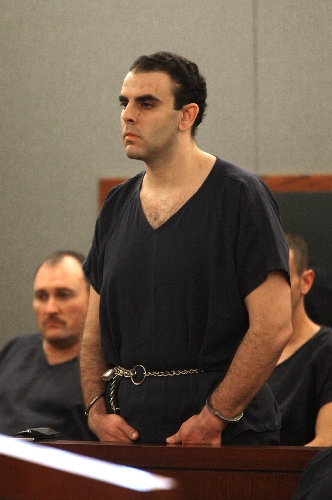Bellagio Bandit sentenced to 3 to 11 years in robbery

The man responsible for last year’s brazen heist of $1.5 million in gambling chips from the Bellagio could be eligible for probation in less than three years.
District Judge Michelle Leavitt on Tuesday sentenced the Bellagio bandit, Anthony Carleo, to three to 11 years in prison for armed robbery and assault with a deadly weapon for the Dec. 14 heist.
It wasn’t the minimum sentence allowed under state law but close to it. Some wonder whether the sentence sends the wrong message to the community.
Referring to the five reported homicides that have happened on the Strip this summer, Bill Thompson, professor emeritus of public administration at the University of Nevada, Las Vegas, said the sentence makes "light of violence on the Strip, when violence on the Strip is becoming more and more obvious."
David Schwartz, director of the Center for Gaming Research at UNLV agreed. "You’d think they would have wanted to send a stronger message," he said.
The maximum sentence under state law was in the range of 12 to 30 years.
Leavitt didn’t comment before handing down the sentence but listened to arguments from prosecutor Chris Owens and defense attorney Bill Terry.
She also heard Carleo apologize for his actions, admitting he acted recklessly when he hit the Bellagio while armed and disguised in motorcycle gear.
"I am truly sorry," said the 30-year-old, who stood dressed in navy blue jailhouse scrubs, his arms and legs shackled and his head bowed. He also apologized to the Bellagio "for the chaos" he caused, to the judge, and his parents who attended the hearing. "My actions were reckless."
Leavitt followed the sentencing recommendation from the board of parole and probation, which took into consideration that Carleo had no prior criminal history and took responsibility for the crime.
Carleo, son of former Las Vegas municipal Judge George Assad, was given credit for having served more than seven months in jail, which means he could be eligible for parole by March 2013. He pleaded guilty in June to the Bellagio robbery as part of a deal negotiated with prosecutors. Eight other felony charges were dropped as part of the deal.
Owens declined to comment after Leavitt ruled because Carleo has yet to be sentenced for the robbery of the Suncoast casino, which happened days before the Bellagio robbery. Carleo will be sentenced Thursday in the Suncoast case by Judge Michael Villani. Owens emphasized that he wants that sentence to run consecutively to the Bellagio case. Terry said he hopes Carleo will be allowed to serve both sentences concurrently.
Alan Feldman, spokesman for the Bellagio’s parent company, MGM Resorts International, told the Review-Journal that he lacked the proper perspective to comment on whether the length of Carleo’s sentence was appropriate but was satisfied the felon was going to prison.
To his knowledge, Feldman said robberies of casinos most often end with arrests and prison time for the perpetrators.
"If you try to rob a casino, the overwhelming likelihood is you will be arrested, and you will go to prison," Feldman said.
But Thompson questioned whether such a short prison term served as an effective deterrent.
Thompson said Carleo needed to spend enough time in prison so that aging would change his behavior.
"He won’t be a different man when he gets out at age 33. But at 50 years old, he’ll be different," said Thompson, who is leaving for Macau to study its gaming industry.
Schwartz said more needs to be done to combat the "anything goes" sentiment about the Strip, including increasing the presence of law enforcement.
Carleo was arrested Feb. 2 and charged in the Bellagio heist after he sold 14 stolen $25,000 chips to an undercover Las Vegas police officer. Carleo was staying at the Bellagio as a comped high-roller at the time.
The officer, Michael Gennaro, testified at a Feb. 23 hearing that Carleo was on a self-described drug and gambling binge that was spiraling out of control.
When Gennaro asked Carleo to join his crew to rob the Bellagio, Carleo told the officer, "I already did" and laughed.
Gennaro testified that during five meetings with Carleo, the officer bought the chips at a cut rate of $7,000 to $10,000 each. Carleo told Gennaro during the meetings that he had gambled away $300,000 at the Bellagio, including $70,000 on New Year’s Eve alone.
Gennaro testified that Carleo complained his father, who was upset with the son’s lifestyle of drug use and gambling, had cut his allowance from $1,000 a month to $600. Carleo was using cocaine and OxyContin, according to the officer’s testimony.
The Bellagio robbery made international headlines and featured security footage of an armed man briskly walking through the casino in a motorcycle helmet. Many likened the robbery to a real-life version of the film "Ocean’s Eleven" because no arrests were made for weeks.
In both the Bellagio and Suncoast robberies, Carleo used a motorcycle for a quick getaway and wore a helmet to conceal his face. No one was hurt in either heist.
According to witnesses in the Bellagio case, the robber dressed in black, wore a white-striped motorcycle helmet and rode a Suzuki motorcycle. He parked at the Bellagio’s north valet entrance for quick access to the gaming floor.
Once inside, Carleo stopped at a craps table near the entrance and told employees to "move." Someone then yelled, "He has a gun," according to testimony from a floor supervisor.
Because of the robbery, the Bellagio discontinued its $25,000 cranberry gambling chips, forcing anyone who had them to redeem them before they became worthless.
Authorities have said a total of $1.2 million in chips and cash has been recovered or accounted for since Carleo’s arrest, but thousands of dollars worth of the chips remain missing.
Assad, who in June lost his bid for re-election to the bench, declined to comment about his son’s case.
Contact reporter Francis McCabe at fmccabe@reviewjournal.com or 702-380-1039.












